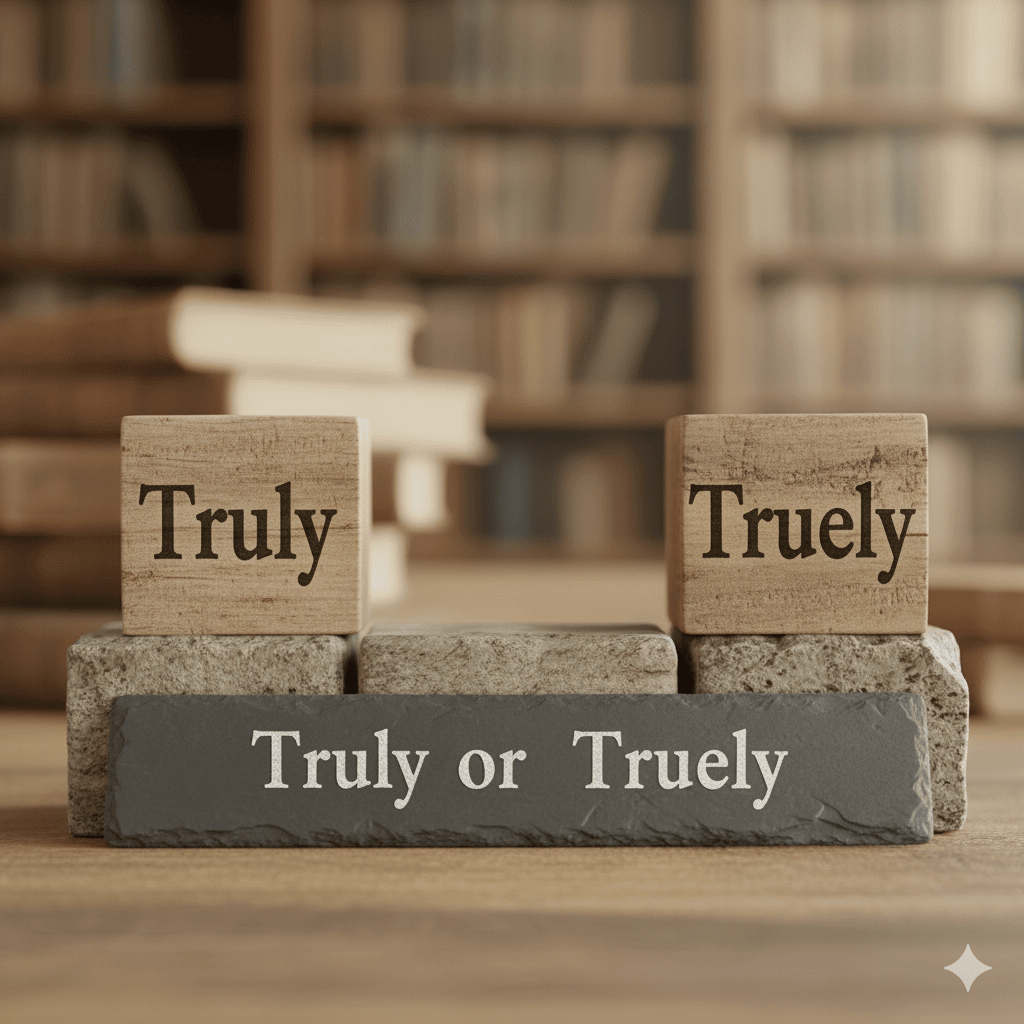Truly vs. Truely: Which One Is Correct?
 The correct spelling is “truly.”
The correct spelling is “truly.”
The word “truely” is incorrect and considered a common spelling mistake.
Even though true ends with an “e,” when you add “-ly” to form the adverb, the “e” is dropped — just like in duly (from due) and wholly (from whole).
Truly: The Correct Form
Meaning
“Truly” is the adverb form of true. It means sincerely, genuinely, or in truth.
Examples (10 total)
- I truly appreciate your help.
- She is truly talented.
- This is a truly amazing story.
- He spoke truly from the heart.
- We are truly grateful for your support.
- That was a truly unforgettable experience.
- You’re truly one of a kind.
- They truly believed they could win.
- It’s truly a dream come true.
- I’m truly sorry for the mistake.
🧠 Tip:
If it means honestly, really, or sincerely, use truly (never truely).
Why “Truely” Is Wrong
When adding “-ly” to words ending in “e,” English spelling rules often drop the “e.”
So:
- true + ly → truly
- due + ly → duly
- whole + ly → wholly
This pattern is an exception to the general rule of keeping the final “e.”
Quick Grammar Check
| Word | Correct? | Meaning | Example |
|---|---|---|---|
| Truly | ✅ | Genuinely, sincerely | She’s truly kind. |
| Truely | ❌ | Incorrect spelling | ✖ Avoid using this form. |
Common Phrases Using “Truly”
- Truly grateful → I’m truly grateful for your help.
- Truly sorry → I’m truly sorry about that.
- Truly unique → This idea is truly unique.
- Truly madly deeply → (popular expression from a song)
- Truly amazing → It was truly amazing to watch.
Why It Matters
Using correct spelling like truly makes your writing look professional and trustworthy.
Small errors such as “truely” can make your text look unpolished — something Humanizey helps you avoid by checking and refining every word for natural flow.
FAQs
1. Is “truely” ever correct in British English?
No. Both American and British English use truly as the only correct form.
2. What part of speech is “truly”?
It’s an adverb — it describes how something is done (e.g., He is truly happy).
3. Can I use “truly” instead of “really”?
Often, yes. Both mean genuinely, though truly can sound more emotional or formal.
4. What’s the adjective form of “truly”?
The adjective is true (e.g., a true friend).
Practice: Choose the Correct Word (“Truly” or “Truely”)
(Answers are listed at the end.)
- I’m ___ sorry for what happened.
- She’s a ___ wonderful person.
- He spoke ___ about his feelings.
- That was a ___ remarkable performance.
- We are ___ thankful for your help.
- This idea is ___ unique.
- The movie was ___ unforgettable.
- You’re a ___ kind soul.
- I’m ___ impressed by your work.
- It’s a ___ inspiring story.
Answers
- truly
- truly
- truly
- truly
- truly
- truly
- truly
- truly
- truly
- truly
